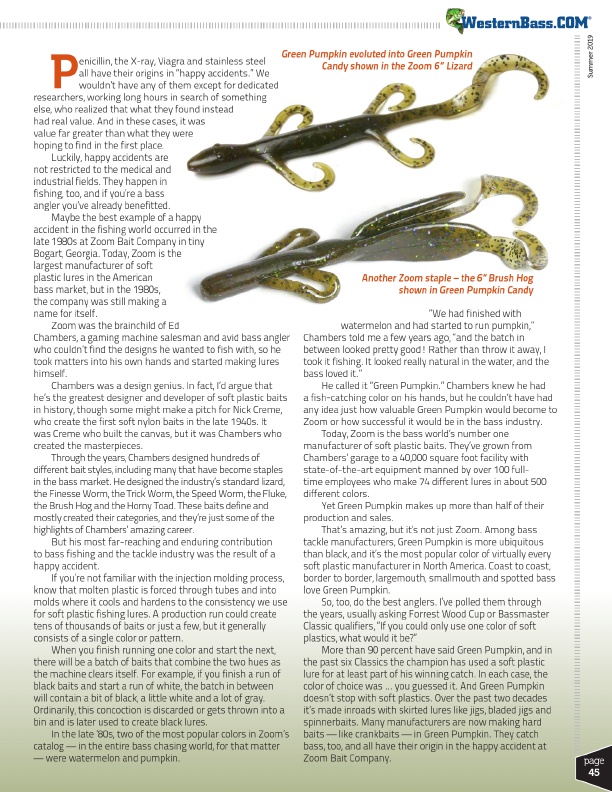
®
P
aenllihciallvine, tthheeirXo-rriagyin, Vsiaingr“haaapnpdysatcacinidleesnstss.”teWele Green PumCapnkdiny esvhoolwutnedininthtoe GZroeoemn 6P”umLizpakrind
wouldn’t have any of them except for dedicated researchers, working long hours in search of something
else, who realized that what they found instead
had real value. And in these cases, it was
value far greater than what they were
hoping to find in the first place.
Luckily, happy accidents are
not restricted to the medical and
industrial fields. They happen in
fishing, too, and if you’re a bass
angler you’ve already benefitted.
Maybe the best example of a happy
accident in the fishing world occurred in the
late 1980s at Zoom Bait Company in tiny
Bogart, Georgia. Today, Zoom is the
largest manufacturer of soft
plastic lures in the American
Another Zoom staple – the 6“ Brush Hog
bass market, but in the 1980s,
shown in Green Pumpkin Candy
the company was still making a
name for itself.
“We had finished with
Zoom was the brainchild of Ed
watermelon and had started to run pumpkin,”
Chambers, a gaming machine salesman and avid bass angler Chambers told me a few years ago, “and the batch in
who couldn’t find the designs he wanted to fish with, so he between looked pretty good! Rather than throw it away, I
took matters into his own hands and started making lures
took it fishing. It looked really natural in the water, and the
himself.
bass loved it.”
Chambers was a design genius. In fact, I’d argue that
He called it “Green Pumpkin.” Chambers knew he had
he’s the greatest designer and developer of soft plastic baits a fish-catching color on his hands, but he couldn’t have had
in history, though some might make a pitch for Nick Creme, any idea just how valuable Green Pumpkin would become to
who create the first soft nylon baits in the late 1940s. It
Zoom or how successful it would be in the bass industry.
was Creme who built the canvas, but it was Chambers who
Today, Zoom is the bass world’s number one
created the masterpieces.
manufacturer of soft plastic baits. They’ve grown from
Through the years, Chambers designed hundreds of
Chambers’ garage to a 40,000 square foot facility with
different bait styles, including many that have become staples state-of-the-art equipment manned by over 100 full-
in the bass market. He designed the industry’s standard lizard, time employees who make 74 different lures in about 500
the Finesse Worm, the Trick Worm, the Speed Worm, the Fluke, different colors.
the Brush Hog and the Horny Toad. These baits define and
Yet Green Pumpkin makes up more than half of their
mostly created their categories, and they’re just some of the
production and sales.
highlights of Chambers’ amazing career.
That’s amazing, but it’s not just Zoom. Among bass
But his most far-reaching and enduring contribution
tackle manufacturers, Green Pumpkin is more ubiquitous
to bass fishing and the tackle industry was the result of a
than black, and it’s the most popular color of virtually every
happy accident.
soft plastic manufacturer in North America. Coast to coast,
If you’re not familiar with the injection molding process, border to border, largemouth, smallmouth and spotted bass
know that molten plastic is forced through tubes and into
love Green Pumpkin.
molds where it cools and hardens to the consistency we use
So, too, do the best anglers. I’ve polled them through
for soft plastic fishing lures. A production run could create
the years, usually asking Forrest Wood Cup or Bassmaster
tens of thousands of baits or just a few, but it generally
Classic qualifiers, “If you could only use one color of soft
consists of a single color or pattern.
plastics, what would it be?”
When you finish running one color and start the next,
More than 90 percent have said Green Pumpkin, and in
there will be a batch of baits that combine the two hues as the past six Classics the champion has used a soft plastic
the machine clears itself. For example, if you finish a run of lure for at least part of his winning catch. In each case, the
black baits and start a run of white, the batch in between
color of choice was … you guessed it. And Green Pumpkin
will contain a bit of black, a little white and a lot of gray.
doesn’t stop with soft plastics. Over the past two decades
Ordinarily, this concoction is discarded or gets thrown into a it’s made inroads with skirted lures like jigs, bladed jigs and
bin and is later used to create black lures.
spinnerbaits. Many manufacturers are now making hard
In the late ’80s, two of the most popular colors in Zoom’s baits — like crankbaits — in Green Pumpkin. They catch
catalog — in the entire bass chasing world, for that matter bass, too, and all have their origin in the happy accident at
— were watermelon and pumpkin.
Zoom Bait Company.
Summer 2019
page 45